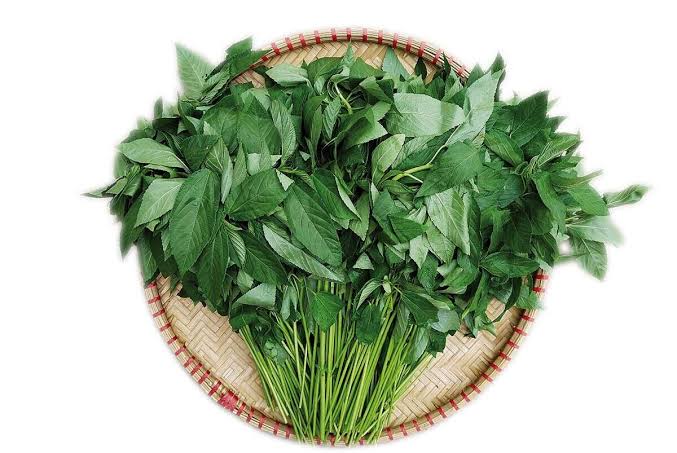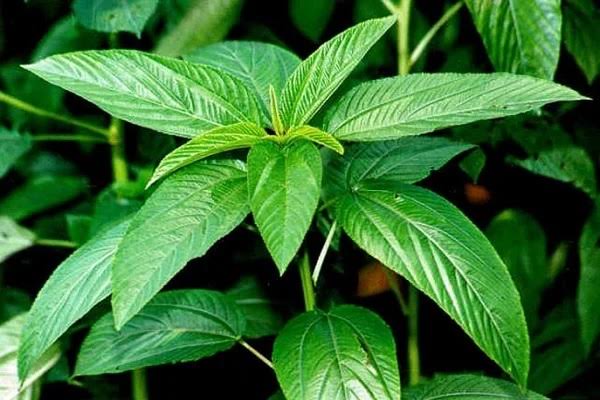Introduction to Jute Leaves
Discover the health wonders of jute leaves, packed with antioxidants and vital nutrients. From supporting digestive and heart health to improving skin and eye health, these versatile greens offer a range of benefits.
Jute leaves, also known as “Paat Shak” in Bangladesh, “Saluyot” in the Philippines, “Molokhia” in Egypt, and “Ewedu” in Nigeria, are nutrient-rich leafy greens that belong to the Corchorus genus. The scientific names for jute leaves include Corchorus olitorius and Corchorus capsularis. These versatile leaves are not only edible but also hold immense medicinal value.
Jute leaves are commonly used as a culinary ingredient in various parts of the world, especially in Asian, Middle Eastern, and African cuisines. They can be added to soups, stews, salads, and stir-fries. Additionally, they are known for their impressive nutrient profile and numerous health benefits.

This post delves into the 10 surprising benefits of consuming this superfood as part of a balanced diet. In addition to being an excellent source of fibre, they are packed with vitamins and antioxidants. Besides being tasty and nutritious, they are widely available and thus affordable too.
Contents
Nutritional Composition and Health Benefits of Jute Leaves
Jute leaves are packed with essential nutrients, vitamins, and minerals. They are an excellent source of vitamins A, C, E, and K, as well as folate, iron, magnesium, calcium, and fiber. These nutrient-rich leaves offer a variety of health benefits, including the following:
1. Rich in Antioxidants
Jute leaves are abundant in antioxidants, including vitamins A, C, and E, as well as phytonutrients like flavonoids and polyphenols. These antioxidants play a crucial role in neutralizing harmful free radicals in the body, thereby protecting cells from oxidative damage.
By combating oxidative stress, they contribute to overall health and well-being, reducing the risk of chronic diseases such as heart disease, cancer, and neurodegenerative disorders like Alzheimer’s and Parkinson’s disease.
Incorporating these leaves into your diet can help fortify your body’s natural defense mechanisms and promote longevity.
2. Supports Digestive Health
The remarkable fiber content found in jute leaves serves as a boon for digestive health. With each serving, they provide a significant dose of dietary fiber, aiding in the smooth passage of food through the digestive tract. This promotes regular bowel movements, prevents constipation, and alleviates discomfort associated with gastrointestinal issues. Moreover, the soluble fiber in them acts as a prebiotic, nourishing beneficial gut bacteria and fostering a balanced gut microbiome.
By supporting optimal digestion and gut health, they contribute to overall wellness and vitality. Incorporating jute leaves into your diet can help maintain digestive regularity and enhance nutrient absorption, ensuring your digestive system functions at its best.
3. Boosts Immune System
Jute leaves boast a notable concentration of vitamin C, a powerhouse nutrient renowned for its immune-boosting properties. This essential vitamin serves as a frontline defender against infections and illnesses, fortifying the body’s natural defense mechanisms. Through bolstering the immune system, vitamin C found in jute leaves helps ward off pathogens and viruses, reducing the risk of common colds, flu, and other respiratory infections.
Additionally, vitamin C plays a pivotal role in collagen synthesis, supporting skin health and wound healing. Incorporating jute leaves into your diet provides a potent dose of vitamin C, empowering your immune system to combat external threats and maintain optimal health year-round.
4. Improves Eye Health
Jute leaves serve as an abundant source of vitamin A, a vital nutrient crucial for maintaining optimal vision and supporting overall eye health. Vitamin A plays a pivotal role in various aspects of ocular function, including the synthesis of visual pigments in the retina and the maintenance of the cornea and other ocular tissues. By ensuring adequate levels of vitamin A, jute leaves contribute to the prevention of vision-related disorders such as night blindness, dry eyes, and age-related macular degeneration.
Furthermore, vitamin A supports the integrity of the eye’s surface epithelium, protecting against infections and promoting healing in case of injury. Incorporating jute leaves into your diet provides a natural and effective way to nourish your eyes and preserve vision clarity for years to come.
5. Supports Bone Health
The presence of calcium and vitamin K in jute leaves underscores their importance in promoting robust bone health. Calcium, a mineral renowned for its role in bone formation and maintenance, works synergistically with vitamin K to support skeletal strength and density. Together, these nutrients aid in the mineralization of bone tissue, ensuring optimal bone structure and integrity. Calcium provides the essential building blocks for bone formation, while vitamin K facilitates the incorporation of calcium into the bone matrix, enhancing bone density and resilience.
By consuming jute leaves regularly, individuals can fortify their skeletal system, reducing the risk of osteoporosis and fractures associated with bone weakening. Incorporating jute leaves into your diet offers a natural and nutrient-rich approach to nurturing strong and healthy bones, promoting lifelong skeletal health and vitality.
6. Regulates Blood Sugar Levels
Studies have demonstrated that jute leaves possess properties that aid in the regulation of blood sugar levels, making them a valuable addition to the diet for individuals managing diabetes or those at risk of developing the condition. The bioactive compounds present in jute leaves, such as flavonoids and polyphenols, exert beneficial effects on glucose metabolism, enhancing insulin sensitivity and facilitating glucose uptake by cells.
Additionally, the high fiber content in jute leaves slows down the absorption of sugar in the bloodstream, preventing rapid spikes in blood glucose levels after meals. By incorporating jute leaves into their diet, individuals can support glycemic control, reducing the risk of hyperglycemia and its associated complications. This makes jute leaves a promising natural remedy for promoting metabolic health and managing diabetes effectively.
7. Supports Heart Health
The presence of potassium and magnesium in jute leaves underscores their pivotal role in maintaining optimal blood pressure levels and promoting cardiovascular health. Potassium acts as a vasodilator, helping to relax blood vessels and reduce the strain on the heart, thereby lowering blood pressure.
Magnesium also plays a crucial role in regulating heart rhythm and muscle function, further supporting cardiovascular function. Together, these minerals work synergistically to prevent hypertension, reduce the risk of stroke, and protect against heart disease. By incorporating jute leaves into the diet, individuals can enhance their potassium and magnesium intake, supporting overall cardiovascular well-being and reducing the risk of cardiovascular-related complications.
8. Anti-inflammatory Properties
Jute leaves are endowed with potent anti-inflammatory properties, making them a valuable asset in alleviating inflammation and mitigating symptoms associated with conditions such as arthritis. The bioactive compounds found in jute leaves, including flavonoids and polyphenols, exhibit anti-inflammatory effects by inhibiting the production of pro-inflammatory cytokines and enzymes. This helps to suppress the inflammatory response within the body, thereby reducing pain, swelling, and stiffness commonly experienced by arthritis sufferers.
The high antioxidant content in jute leaves further enhances their anti-inflammatory action by neutralizing free radicals and oxidative stress, which can exacerbate inflammation. By incorporating jute leaves into the diet, individuals can harness the natural healing power of these leafy greens to ease discomfort and improve joint mobility, promoting better quality of life for those living with arthritis.
9. Aids Weight Loss
The substantial fiber content found in jute leaves serves as a valuable ally in weight management and healthy weight loss endeavors. Dietary fiber contributes to feelings of satiety and fullness, promoting a sense of satisfaction after meals and curbing appetite throughout the day. By slowing down the digestion and absorption of nutrients, fiber helps to regulate blood sugar levels and prevent spikes in insulin, which can contribute to fat storage and weight gain.
Fiber also adds bulk to the diet, promoting regular bowel movements and reducing the likelihood of overeating or snacking on calorie-dense foods. Incorporating jute leaves into the diet provides a nutrient-dense and low-calorie option for promoting feelings of fullness and supporting healthy weight loss efforts. By including jute leaves in meals and snacks, individuals can enjoy a satisfying and nourishing addition to their diet while working towards their weight management goals.
10. Promotes Skin Health
The vitamins and antioxidants abundant in jute leaves play a pivotal role in nurturing healthy, radiant skin by stimulating collagen production and safeguarding against skin damage. Vitamin C, in particular, serves as a potent antioxidant that combats free radicals and oxidative stress, preventing premature aging and preserving skin elasticity.
By promoting collagen synthesis, vitamin C helps maintain skin firmness and resilience, reducing the appearance of fine lines and wrinkles. Additionally, vitamin A found in jute leaves supports skin cell turnover and regeneration, promoting a smoother and more youthful complexion. Furthermore, the presence of other antioxidants such as flavonoids and polyphenols in jute leaves helps protect skin cells from UV damage and environmental pollutants, preserving skin health and vitality.
By incorporating jute leaves into the diet, individuals can nourish their skin from within, promoting a healthy and radiant complexion that glows with vitality.
Jute Leaves as a Superfood
Jute leaves are not only flavorful and versatile in cooking but also provide a myriad of health benefits. From boosting immunity to supporting bone health and aiding digestion, the nutrition-rich jute leaves are a valuable addition to any diet. Incorporating jute leaves into your meals can offer a delicious and nutritious way to enhance your overall well-being. Now that you’re aware of the multitude of benefits of this amazing plant, why not check out this easy recipe below.
It would be imprudent not to end this post without a health warning, so make sure to exercise caution before trying any new food if you’re unaware of how you will react to it.
Those who are allergic to jute leaves should avoid them altogether. If you experience an allergic reaction, visit your nearest emergency department.
What are jute leaves? Nutrition, benefits, and how to eat them – Healthline.
MASK Associates is a leading exporter of top-tier jute and jute-based products from Bangladesh. Our commitment to excellence, innovation, and technology guarantees superior jute sourced from premier fibres globally.



